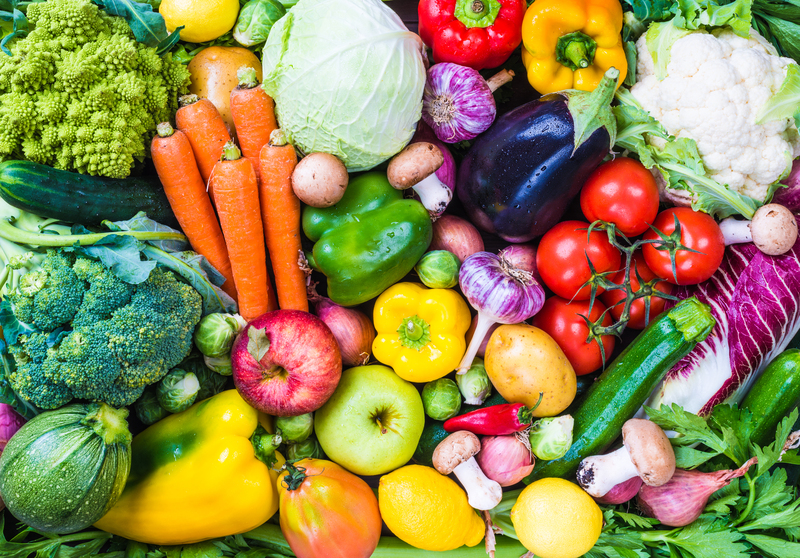Innovative Approaches to Boosting Soil Fertility
Posted on 17/06/2025
Innovative Approaches to Boosting Soil Fertility
Soil fertility is the cornerstone of successful agriculture, healthy ecosystems, and the foundation for global food security. As modern agricultural practices and climate change continue to impact soil health, there is a growing need for innovative approaches to boosting soil fertility. From harnessing cutting-edge technologies to revisiting ancient wisdom, farmers and scientists are embracing novel methods to enhance soil productivity in sustainable ways. In this comprehensive article, we will explore the most effective strategies for improving soil health, examining both traditional techniques and modern innovations that are transforming the future of soil management.
Understanding Soil Fertility: The Basics
Before diving into innovative solutions, it's important to understand what soil fertility encompasses. Soil fertility refers to the soil's ability to supply essential nutrients to plants, support root growth, and maintain physical, chemical, and biological conditions that foster sustainable plant production.
- Chemical fertility: The availability of macronutrients (Nitrogen, Phosphorus, Potassium) and micronutrients.
- Physical fertility: Soil structure, aeration, water retention, and drainage capacity.
- Biological fertility: Presence of beneficial microbes, organic matter, and soil fauna.
Historically, farmers relied on practices like crop rotation, composting, and green manuring to maintain soil fertility. While these methods are still valuable, advancements in science and technology have led to creative new approaches to soil fertility enhancement that promise greater sustainability and improved yields.

Innovative Biological Techniques for Soil Fertility Improvement
1. Biofertilizers and Microbial Inoculants
One of the most promising innovative approaches to soil fertility is the use of biofertilizers and microbial inoculants. Biofertilizers are substances containing living microorganisms that, when applied to seed, plant surfaces, or soil, colonize the rhizosphere and promote growth by increasing the supply of primary nutrients.
- Rhizobium for legumes: Fixes atmospheric nitrogen into a form usable by plants.
- Azotobacter and Azospirillum: Free-living nitrogen fixers beneficial for cereals and vegetables.
- Phosphate solubilizing bacteria (PSB): Make phosphorus more available to plant roots.
- Mycorrhizal fungi: Enhance water and nutrient absorption, especially phosphorus.
Regular application of biofertilizers can reduce dependency on synthetic fertilizers, preserve soil health, and increase crop yields. The market for biofertilizers is expanding rapidly, reflecting a global shift toward biological solutions for soil fertility enhancement.
2. Cover Cropping and Green Manures
Planting cover crops such as clover, vetch, and rye during off-seasons is an effective age-old practice reimagined with modern precision. These crops add organic matter, fix atmospheric nitrogen (in the case of legumes), and suppress weeds. When incorporated into the soil as green manure, they decompose and release nutrients back into the soil.
- Improved soil structure and porosity.
- Enhanced microbial activity.
- Reduced soil erosion and nutrient leaching.
Modern innovations include multispecies cover cropping, utilizing drone seeding, and pairing specific cover crop blends tailored to regional soil needs. Research supports that multifunctional cover cropping can play a vital role in improving soil quality and boosting fertility sustainably.
Technological Innovations in Soil Fertility Enhancement
1. Precision Agriculture and Soil Testing
Precision agriculture leverages technology--such as remote sensing, GIS mapping, and IoT-powered soil sensors--to provide real-time data on soil properties. This data-driven approach allows farmers to apply fertilizers, water, and amendments exactly where and when they are needed, minimizing waste and maximizing yields.
- Geo-referenced soil sampling uncovers variations in soil fertility across fields.
- Sensor networks monitor soil moisture, nutrition, and pH in real time.
- Drones and satellites track crop health, soil cover, and nutrient deficiencies.
These tools enable site-specific management, reducing costs and environmental impact. Precision agriculture paves the way for smart soil fertility management and enhances resource-use efficiency.
2. Custom Blended Fertilizers
Traditional "one-size-fits-all" fertilizers can lead to both nutrient deficiencies and harmful excesses in soils. Modern advancements in soil testing and data analytics now allow for custom blending of fertilizers tailored to specific areas or even zones within a field.
- Optimized nutrient ratios to match crop and soil requirements.
- Reduced fertilizer runoff and environmental pollution.
- Improved nutrient uptake efficiency.
By delivering the right nutrients in the right amounts at the right time, farmers can significantly enhance soil fertility and achieve higher agricultural productivity with minimal waste.
Regenerative Agriculture: A Paradigm Shift
1. Conservation Tillage and No-Till Farming
Conventional soil tilling disrupts soil structure and promotes erosion and carbon loss. In contrast, no-till and conservation tillage practices maintain soil cover, minimize disturbance, and support the buildup of organic matter. Over time, these methods increase soil water retention, improve structure, and boost fertility.
- Enhanced carbon sequestration.
- Reduced soil erosion and compaction.
- Greater resilience to drought and climate stress.
Adopting conservation tillage is a key innovative approach to sustainable soil fertility improvement for both smallholder and commercial farms.
2. Agroforestry Systems
Integrating trees and shrubs into crop and livestock systems--also known as agroforestry--brings numerous soil health benefits. Tree roots stabilize the soil, increase organic matter through leaf litter, fix atmospheric nitrogen (in the case of certain leguminous species), and provide shade that moderates soil temperatures.
- Increased biodiversity supports beneficial soil organisms.
- Improved water infiltration and retention.
- Long-term nutrient cycling through deep-rooted species.
Agroforestry practices are gaining recognition worldwide as scalable, innovative methods to enhance soil fertility while supporting ecosystem health.
Soil Amendments: New Materials for Old Challenges
1. Biochar Application
Biochar--charcoal produced from organic waste materials--has emerged as a revolutionary amendment for improving soil fertility. When added to soil, biochar improves its physical structure, holds nutrients and water, and enhances microbial life.
- Long-lasting carbon storage improves soil health for decades.
- Increased nutrient retention reduces leaching.
- Greater microbial diversity and activity.
Research indicates that biochar can significantly boost soil productivity, especially when combined with organic fertilizers, making it an exciting area for ongoing soil science innovation.
2. Organic Matter Recycling and Composting
The return of organic waste to the soil, through composting, is not a new concept. However, modern composting systems--including vermicomposting (using earthworms) and aerobic digesters--allow farmers to rapidly process large volumes of organic waste into high-quality soil amendments.
- Restores depleted soil organic matter.
- Enhances nutrient content and soil structure.
- Reduces waste sent to landfills and greenhouse gas emissions.
Learn more about modern composting and soil management.
Emerging Trends in Enhancing Soil Fertility
1. Nano-fertilizers and Smart Fertilizer Delivery
Recent breakthroughs in nanotechnology have made it possible to deliver nutrients in highly targeted, efficient ways. Nano-fertilizers consist of nanoparticles that increase nutrient use efficiency and reduce losses due to volatilization or leaching.
- Precise nutrient release triggered by plant needs.
- Reduced environmental footprint.
- Enhanced plant uptake and crop performance.
Ongoing research points to the potential of smart fertilizer delivery systems as the next frontier in sustainable soil fertility management.
2. Integrated Soil Health Monitoring with AI
Artificial Intelligence (AI) and machine learning are changing the way we monitor, predict, and manage soil fertility. By analyzing vast and complex data sets from remote sensors, satellite imagery, and historical crop data, AI can provide real-time recommendations for nutrient management.
- Automated soil quality assessment and alerts.
- Predictive analytics for fertilizer needs.
- Optimization of crop rotations and soil amendments.
Agricultural platforms powered by AI are driving data-driven soil fertility enhancement for both large-scale and smallholder farmers around the world.

Challenges and Considerations in Soil Fertility Innovation
While the benefits of modern soil fertility strategies are significant, several challenges remain:
- High initial investment costs for advanced technologies.
- Lack of technical knowledge among smallholder farmers.
- Variability in local soil and climate conditions.
- Potential ecological risks with new inputs (e.g., nano-materials).
To achieve widespread, sustainable improvement in soil health, it is crucial to promote education, support local innovation, and ensure equitable access to new tools and practices.
Conclusion: Towards Sustainable Soil Fertility Enhancement
As we have explored, there are a multitude of innovative approaches to boosting soil fertility that are reshaping modern agriculture. By combining traditional wisdom with scientific breakthroughs, farmers have powerful new tools to restore and maintain fertile soils.
Key avenues for improving soil productivity in the 21st century include:- Biological solutions using beneficial microbes, cover crops, and green manures.
- Advanced technologies like precision agriculture, AI, and nano-fertilizers.
- Regenerative agriculture practices that heal soils and support ecosystems.
- Recycling and using new amendments such as compost and biochar.
Building resilient and productive soils is not only essential for food security and profitability--it is also a key strategy in combating climate change and supporting biodiversity. By encouraging the adoption of these innovative soil fertility enhancement methods, we can ensure that current and future generations enjoy the benefits of healthy, productive land.
Whether you are a farmer, gardener, researcher, or policymaker, staying informed about the latest trends and technologies in soil fertility improvement can empower you to make sustainable choices and contribute to a more resilient agricultural future.
Unlock the full potential of your land by embracing new approaches to soil fertility management--and be part of the next agricultural revolution!


